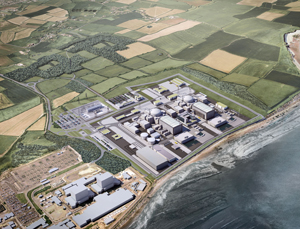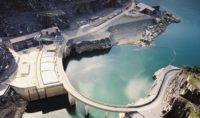

China’s state-owned nuclear industry has secured a major European foothold with deals announced on Oct. 21 for the first new plants in the U.K. in more than two decades.
Construction of the two 1,660-MW European pressurized-reactor (EPR) water units, valued at more than $22 billion, is set to start next summer on the Hinkley Point C project, in Somerset, England, subject to final financing decisions next year by the French project developer EDF Group.
The project would be adjacent to the site's existing Hinkley Point B nuclear plant, operating since 1995.
Following a visit to China by a bevy of ministers, the U.K. government approved the acquisition by two of China’s main nuclear-power operators of minority shares in the Hinkley Point C consortium.
China could take majority control of future nuclear projects, according to the U.K. finance ministry. U.K. government energy strategy calls for at least 12 new nuclear reactors totaling 16 GW at five sites by 2030.
China General Nuclear Corp. and China National Nuclear Corp. now are negotiating for a 30% to 40% share of the joint venture that will build and operate the Hinkley project.
EDF Group will control about 45% to 50%, and nuclear-plant maker AREVA S.A. will own 10%. The French government has controlling interests in both of these Paris-based nuclear companies. EDF says it is discussing "with a short list of other interested parties" to take up to a 15% share.
EDF is considering building a similar plant at Sizewell, England, U.K.
EDF and China National Nuclear currently are building the 3,320-MW EPR plant at Taishan, in China's Guangdong province, under a joint-venture agreement signed in 2007. AREVA is part of the team, with local firms, providing Taishan’s nuclear equipment.
Almost 90 contracts could be delivered for manufacturing and erection, says Michael Dudas, engineering and construction sector analyst for Sterne Agee. He says Areva’s reactor design has been approved by the UK Nuclear Regulator, adding that "while the firm's U.S. consortium partner has historically been Bechtel, its UK partnership plans remain unclear."
“Investment from Chinese companies in the U.K. electricity market is welcome, providing they can meet our stringent regulatory and safety requirements,” says Edward Davey, U.K. secretary of state for energy and climate change.
Key to the Hinkley Point decision is an agreement by the U.K. government to guarantee that the price of electricity from the planned plant never falls below a “strike price” of $148 (£92.5) per megawatthour (MwH). The operator will charge no more than the strike price, which is roughly double the current wholesale rate.
The index-linked price guarantee will run for 35 years after the start of operation, set for 2023. The U.K. government also has agreed to provide guarantees for up to 65% of the project finance raised by the EDF team.
Preliminary construction already has begun at Hinkley Point, and EDF has provisionally agreed to all the main construction contracts. A joint venture of Paris-based Bouygues S.A. and Laing O’Rourke plc., Dartford, England, will handle civil work. U.K.-based Costain will handle marine work, while Alstom will supply the turbines.
EDF says the project includes construction of a spent-fuel storage facility and that, for the first time in the U.K., costs of waste and decommissioning "are built into the project up-front though a funded decommissioning program."
EDF also claims that 57% of the project's construction value would be spent in the U.K., with the potential for up to 25,000 jobs, including 400 apprentices and, when operational, a staff of 900. The developer also points to new investment in local colleges and the creation of enterprise and construction skills centers.
Dudas says China remains the world’s fastest-growing civil nuclear power market. Builder CB&I signed an agreement earlier this month with China Power Investment Corp. to form a joint venture to build plants there. China’s investment plan calls for 30 nuclear power plants by 2020.
"CB&I specializes in Westinghouse's nuclear technology, the AP1000 reactor, which could have a robust presence in the potentially explosive Chinese market," says Dudas.
The analyst adds that Westinghouse "also awaits a signoff from its parent Toshiba to buy a large stake in the NuGen consortium that owns the right to build a new reactor at the Sellafield site in the UK. NuGen is owned by GDF Suez and Iberdrola.
According to Dudas, Britain seeks to accelerate new reactors as part of an estimated $180-billion investment plan to replace aging power plants and upgrade grids.




Post a comment to this article
Report Abusive Comment